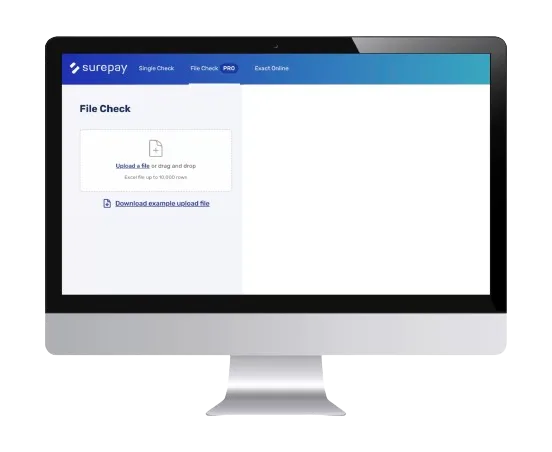Ensuring compliance and efficiency: IBAN-Name Checks for Batches
- Back to overview
- Eelco Rietveld
As the new EU Regulation on Instant Payments approaches its final publication in the Official Journal of the European Union, PSPs must prepare to meet one of the key requirements: verifying the IBAN and Name provided in a payment order by the Payer (Verification of Payee). This responsibility falls on both the Payer PSP, responsible for offering the service, and the Payee PSP, tasked with providing the necessary verification.

This service, commonly referred to as IBAN-Name Check, Confirmation of Payee (CoP) or Verification of Payee, is already widely used in online banking environments in the UK and the Netherlands. However, the upcoming regulation introduces a new mandate: extending the service to customers who submit their payment orders as a package. For the rest of the article the term batch will be used to represent packaged payment orders delivered in a batch or bulk file.
The inclusion of batches presents a fresh challenge for many PSPs, necessitating careful evaluation of compliance approaches. In this blog, we’ll delve into:
- The current role of batch checks in the CoP ecosystem
- The regulatory batch check requirements ahead
- Investigating the impact on PSPs and their customers.
The goal of this article is to stimulate discussions among PSPs regarding this topic. SurePay is ready to assist, leveraging our extensive knowledge of possible solutions and how they align with PSPs’ chosen courses of action. Given the significant impact of batch payments on the total transaction volume, this is not a matter to be taken lightly.
The current role of batches in the CoP ecosystem
Examining the current landscape of Confirmation of Payee in Europe reveals various countries developing or implementing solutions or schemes. To gain insights into how Confirmation of Payee operates in payment scenarios, we must concentrate on the UK and the Netherlands. These are the only countries where CoP solutions are extensively utilised across banks in their online payment channels.
So what place do payments initiated as a batch take in these markets?
In the UK, regulators have excluded batch checks from their scope. However, there’s a growing demand in the market as companies seek ways to verify files with multiple payees, thereby minimising the risk of fraud or payment errors. Turning to the Dutch market, the situation is similar; banks have not yet incorporated batch checks into their transaction channels. Nonetheless, various solutions are available for customers to verify files of IBAN-name combinations, like SurePay’s Online Portal. These solutions are already used by many and market demand continues to rise.
Understanding the regulatory batch check requirements ahead
So, what needs to happen when the new regulation comes into force?
There are few general requirements that apply to both single and ‘packaged’ payment orders:
- Cost: The service needs to be offered by PSPs free of charge.
- Channels: The service needs to be offered regardless of the payment initiation channel used by the payer to place a payment order for the credit transfer.
- Timing: The payer’s PSP must perform that service immediately after the payer provides relevant information about the payee, and before the payer is offered the possibility to authorise that credit transfer.
- Liability: where the IBAN and name provided by the Payer do not match, the Payer PSP needs to notify the Payment Service User that funds might be transferred to a payment account not held by the payee indicated by the payer. If they fail to do so they can be held liable by the payer.
The following requirement is a specific requirement for payment orders submitted as a package:
- Opt-out: PSP’s need to provide Payment Service Users (who are not consumers) the possibility to opt-out from receiving the service, as well as the option to opt-in again. One topic for consideration is: will companies need to be able to indicate if they want the batch checked every time, or just once, until they opt-in again?
- In this article we’ll not cover all requirements regarding how the Verification of Payee should work, just the requirements that have an impact on batches.
PSPs shall provide to PSUs that are not consumers the means to opt out from receiving the service when submitting multiple payment orders as a package
Investigating the impact on PSPs and their customers
When looking into the impact, there are many angles to consider. For now, I’ll focus on the most obvious ones related to packaged payment orders.
The obvious route
Considering the current requirements, the logical step is to conduct the check within the online payment channel, where customers upload their PAIN.001 file containing SEPA (instant) Credit Transfers. Various processes are initiated, one of which would involve verifying the IBAN-Name combinations of the Payees and obtaining a response from the Payee PSP’s. Subsequently, the result can be presented back to the customer. This approach ensures compliance, as the check is performed before final authorization (signing) in the PSP’s online banking channel. The PSP notifies the Payer if any provided IBAN-Name combinations do not match. Should the Payer choose to proceed with the processing, the PSP will not be held liable for any damage resulting from fraudulent payments or mistakes made.
Choosing this path might raise challenges in the following scenarios:
- Partial processing is a partial solution for the company making the batch payment
Where there are No Match and/or Close Match results in the payment package, the transactions that are a Match might be partially processed. This scenario inevitably leads to rework for the customer who initiated the payment package. If the Payer accepts all the discrepancies that are found, errors will remain within the base administration and must be corrected to prevent future issues. And in case the detected discrepancies are not accepted by the Payer a new batch needs to be created after correcting the base administration.
- Changes in host-to-host connections needed
Host-to-host connections used to initiate batch payments, where a front-end at the PSP’s end may not be present, must adapt to the new situation and be able to act on the result of performed checks. This will likely necessitate changes in the batch itself, which must then be sent again with the correct information or modified in the bank channel before releasing the file for further processing. Additionally, automated processes outside office hours, aimed at preventing processing during peak times, may result in batches not being processed at the intended time.
- Authorised transfers send to the PSP through host-to-host connections
For larger companies, a PAIN.001 file may be signed in the ERP or Payments Hub by multiple employees before being sent to the bank. In such cases, who will authorise the final “IBAN-Name checked” file in the bank channel to ensure compliance with regulatory requirements?
The most customer friendly route
When looking at the current market practice and preferred moment in the customer journey to check batch payments, before the batch file is send to the PSP, other challenges pop-up:
- Audit trail to prevent being held liable while offering a customer friendly solution
How will the PSP confirm, if the PSU has not opted out, that the batch is checked and possible discrepancies have been accepted by the PSU to prevent being held liable?
- Allowed timing from a regulatory perspective
Is there room in the regulation to interpret this as a suitable moment in time to check batch payments? Before the customer has the possibility to authorise the Batch: yes. After the Payer provides all relevant information about the Payee: yes. But the regulation also states: “Where the payee’s payment account identifier specified in point (1)(a) of the Annex and name have been inserted in the payment order by the payer, the payer’s PSP shall provide a service for matching the payment account identifier with the name of the payee.”. Strictly speaking, when checking before the batch is generated and sent to the PSP, there is no payment order yet.
Conclusion
These requirements have an impact and ask for a position by PSP’s. A lot of questions still to be answered and choices to be made by PSPs. That’s why it pays to start thinking about how to approach these requirements while there is still time.
As SurePay we are not going to speculate on how PSPs will interpret the regulation, but rather start the conversation on how to best solve this issue in the most customer friendly way that allows the entire ecosystem to reap the benefits from the IBAN-Name Check. One thing that we are confident of is that SurePay can offer the best fitting solution to suit your needs. With multiple solutions already in place for checking files and batches, we are confident in our ability to assist you in finding the optimal solution.
Want to know more?
Read more about our solutions
Schedule a meeting
The latest developments

Elevating Bank Fraud Prevention with Fraud Risk Indicator

Beyond Rumour: Solving GDPR Challenges in IBAN Name Verification

SurePay IBAN-Name Check portal now available in the Exact App Store

SurePay announces one European IBAN-Name Check

CEO fraud runs rampant, but can be minimised with an IBAN-Name Check
